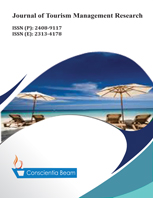Marketing Destination Zimbabwe During and Post the 2000-2008 Political and Economic Crises
DOI:
https://doi.org/10.18488/journal.31/2014.1.1/31.1.14.26Abstract
Consequences of political and economic crises on tourist destinations are profound and inescapable. This paper discusses the 2000-2008 political and economic crisis issue in Zimbabwe in relation to the tourism industry. The 2000-2008 political and economic environment was characterised by political stand- off among the three major political parties, heightened negative publicity, shortages of basic commodities, hyperinflation and isolation of Zimbabwe by the international community. During the height of this crisis, international visitors declined sharply and hotels reported a one digit occupancy figure triggering a tourism crisis. This paper has some significance, as the tourism industry was greatly affected by the political and economic instability. Yet the overall marketing and promotional strategies adopted by stakeholders during and post the crisis to put the tourism industry on the recovery path have been rather minimal. The study used secondary sources of data and netnography to collect data. The article argues that tourist destinations that are prone to political and economic instabilities should be pro-active and device novel marketing strategies to reassure prospective tourists of the safety of the destination. The study revealed that destination Zimbabwe re-engaged with the western markets, courted the Asian market, bid to host high profile events and sought destination endorsement as a cocktail of practical marketing strategies to revive the tourism sector. Recommendations include collaborative marketing campaigns fronted by political leaders, activation of tourism police service and partnering with embassies to ensure visitor`s safety. Future research is suggested at micro level and industry sub-sector level like hotels and tour operators on how they individually market their products during a crisis period.

